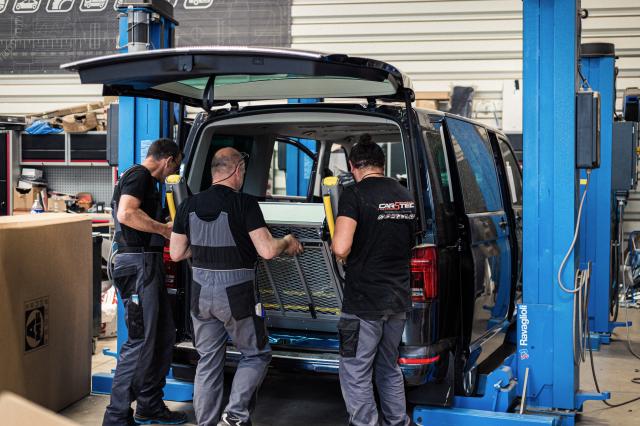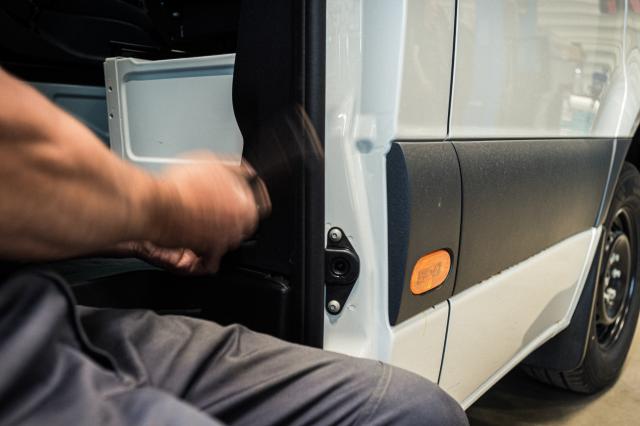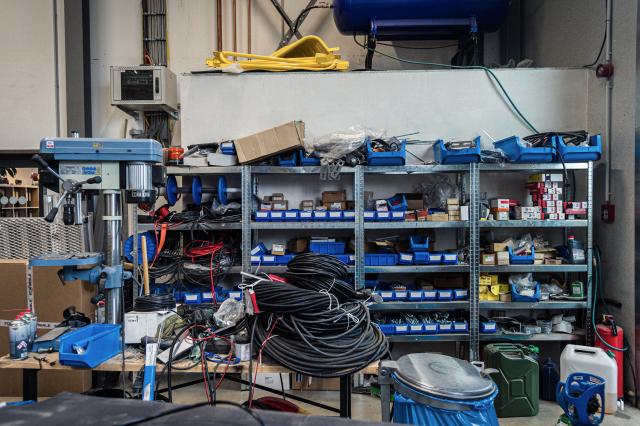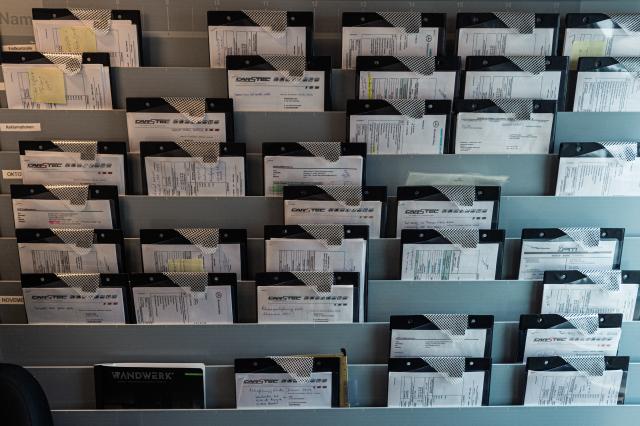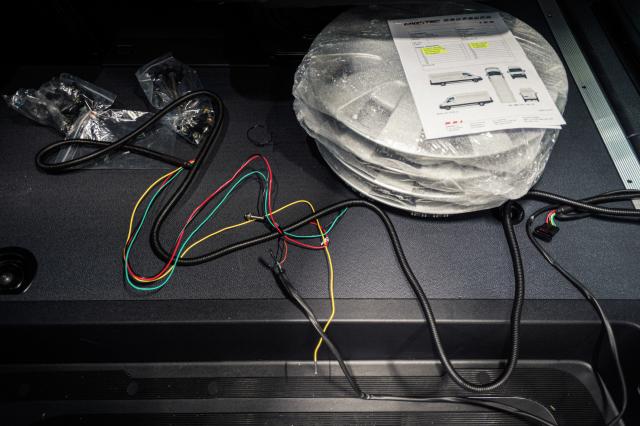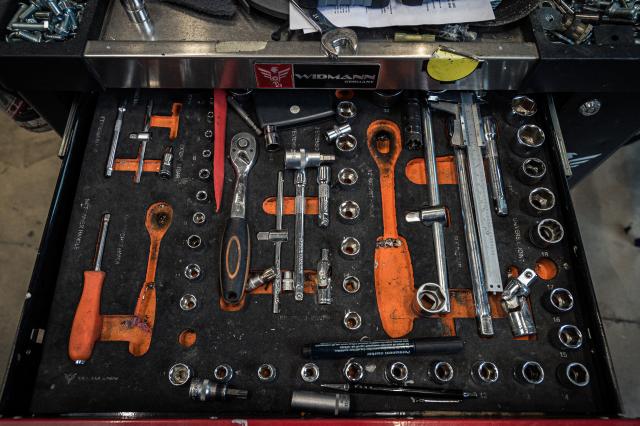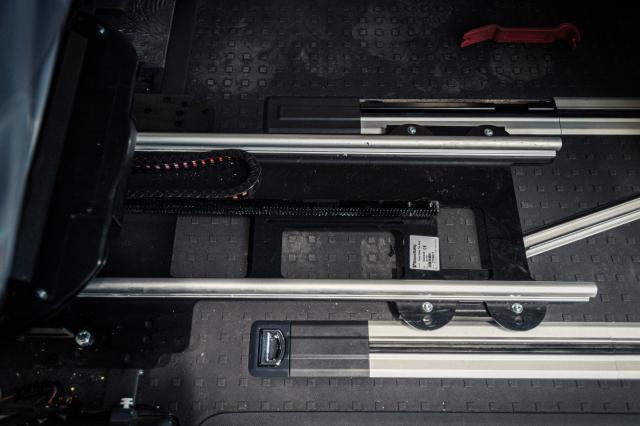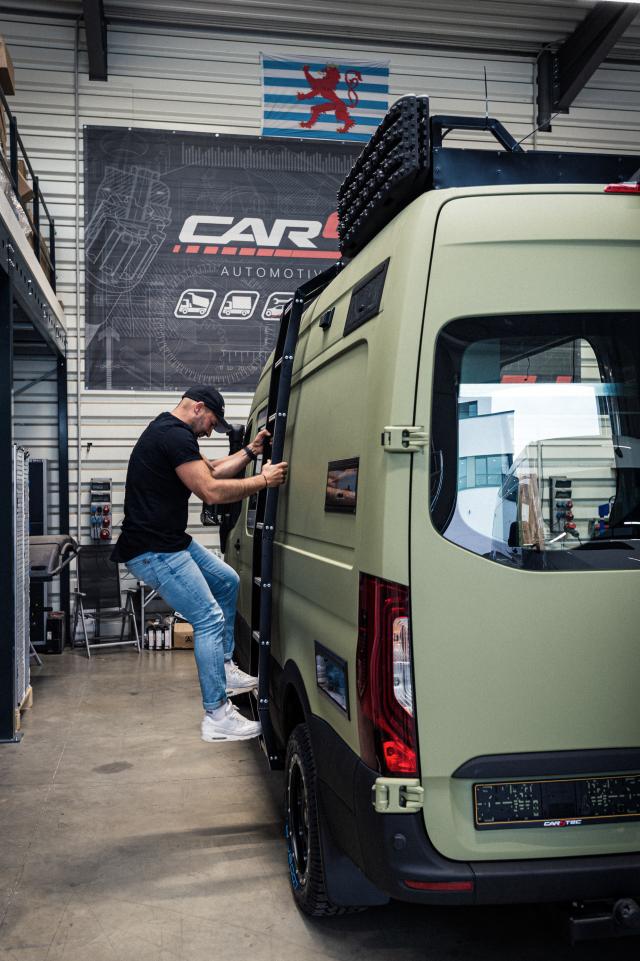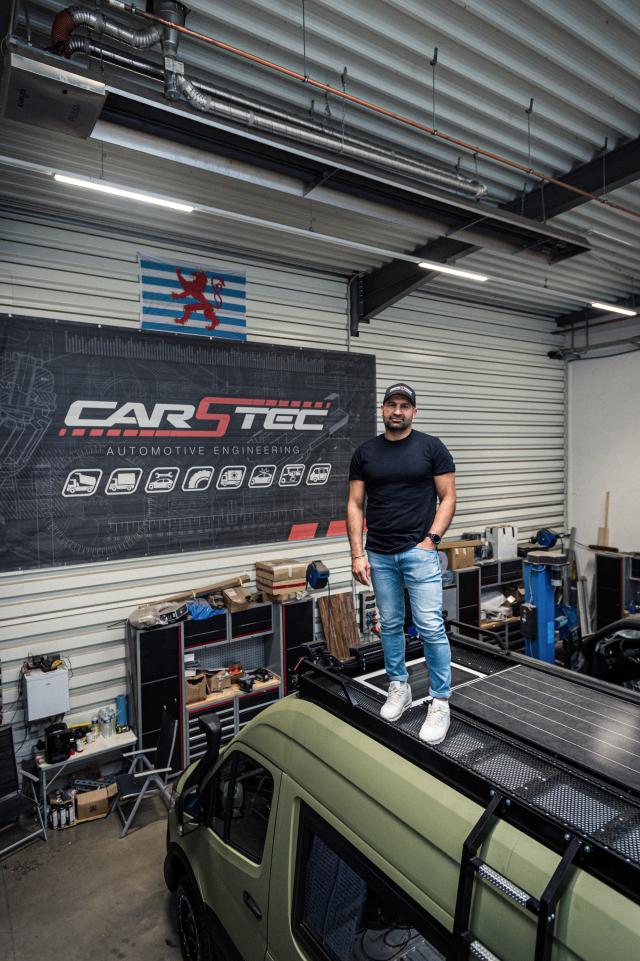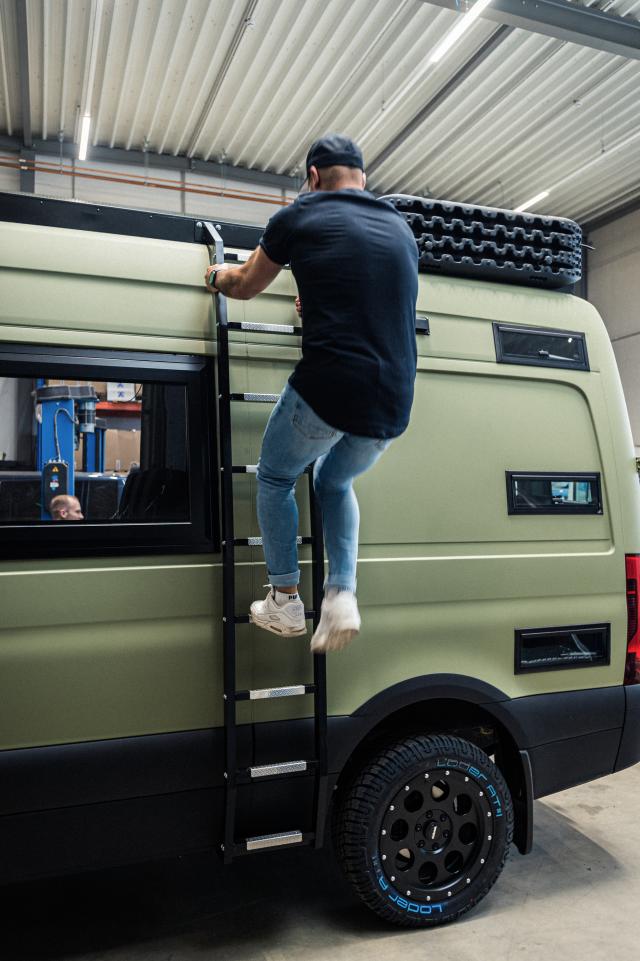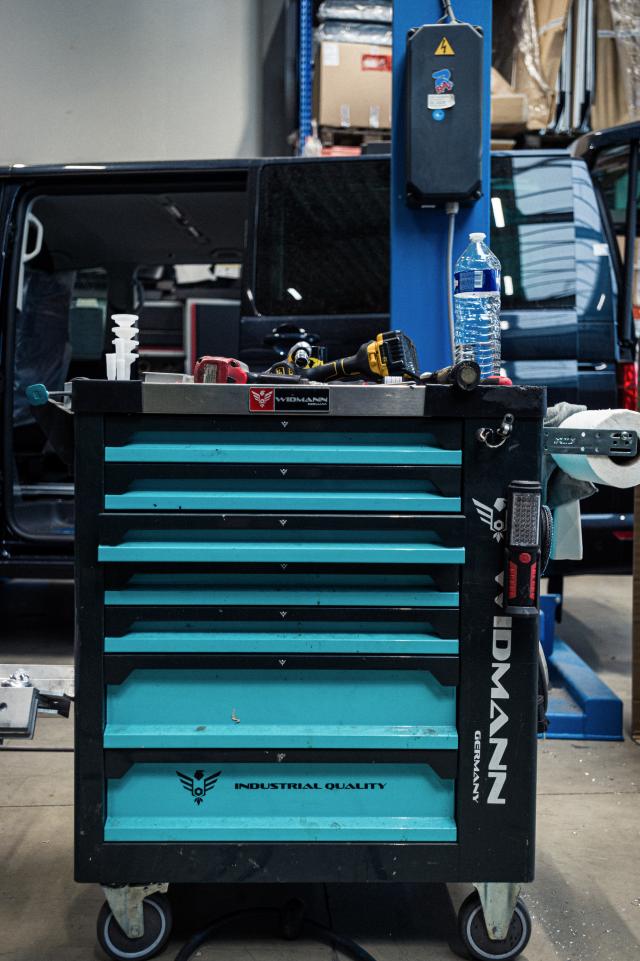Luxembourgish craftsmanship - Nazih Trad
Sponsored content Switch to French for original article
Listen to this article
The feeling of sitting in a moving car is often taken for granted. However, this is not the case. Carstec, a company that converts all types of vehicles for people with reduced mobility, is fighting to change that. Its manager, Nazih Trad, who has experienced more ups and downs than a rollercoaster, knows how to tackle challenges.
It is Monday. The town of Biwer is quiet and slowly entering the week. The sky is grey and the wind is fresh. Just off the roundabout, the An der Grousswiss business park opens onto a small car park full of vans and minibuses parked in front of a refined rusty-looking façade. However, our appointment is at the back of the building.
From the outside, a glass door allows us to see some mechanics in black overalls working on a minibus in a small room, full to bursting with only 3 vehicles. As we enter, a man in his early forties stands out. He is wearing a black t-shirt, light blue jeans, a pair of white sneakers and, above all, a cap bearing the logo of the company: Carstec. "Nazih Trad, enchanté!" he says in charming, German-sounding Luxembourgish. "Carstec is my brand. I live for it. That's why I never go out without my cap (laughs)." These few sentences are enough to feel the passion he has for his job. Smiling, he is dying to show us what he does. While his employees are fitting the minibus with rails, we start by visiting his office.
A large company with small premises
If you can call it an office. Because, like the garage, it's very small. Nazih shares it with his secretary, who is quick to offer us a coffee. To make the most of the space, the plan for his latest project covers the entire wall. "It's secret", he laughs. "But it's meant to come out very slowly. Maybe I'll reveal it to you later." He takes his cup of coffee and sits down.


"What we do here is craftsmanship", he explains. "Real craftsmanship. Specifically, Carstec has taken on the niche sector of vehicle adaptation for people with reduced mobility." Nazih explains: "Sitting systems, wheelchair lifts and supports, access ramps, accessories… For all vehicles, up to 5 tonnes!" The ones they work on the most are buses and minibuses.
In order to be able to do this, his company works with some of the country's large dealerships, "mainly Mercedes Merbag, but also Ford, Renault, Losch and others". The customers range from private individuals "who are sometimes referred to us by the care insurance and whom we accompany from the purchase of the car to its conversion" to bus companies such as "Weber, Sales, Meyers…". So it seems that Nazih has built up a small empire – "the name Carstec is known in the business" – which makes it hard to understand why he has to work in such a small garage. For him, however, the latter is a great victory, because the road he has travelled to get there was a turbulent one, full of twists and turns and injustices.
Lebanese roots and Luxembourg dream
Twenty-five years ago, Nazih never thought he would leave his home country. "I didn't grow up in Luxembourg or Germany. I come from Lebanon." At that time, "I was still young, I was preparing my baccalaureate, I played football…". But this carefree attitude soon evaporated: "Back home, there was war. I experienced the situation they have in Ukraine today." At the dawn of his 20th birthday, he began to ask himself questions.
"All I wanted was a future in which I could be safe." Nazih then packed his bags for Germany and the Ruhr-Universität in Bochum. "I always liked cars, but I didn't want to go in that direction. I wanted to become a surgeon!" However, the numerus clausus prevented him from taking this turn and he fell back on "agro-technology, electrical engineering orientation, where there was a free place". His love for his current job only came later: "The cars, that was spontaneous."
War in Lebanon
Nazih Trad about the war he experienced in Lebanon.

At the Ruhr-Universität, he was alone and lived in a "very small" room. "I only had a student visa, so I couldn't work to earn money. My family, who stayed in Lebanon, didn't have any either…" Despite the culture shock, he has been a studious student… for several semesters. For in the second year of his four-year course, he came across a teacher who "…let's say, was not a fan of foreigners." It was impossible for Nazih to get good marks in this teacher's classes. "He put obstacles in my way to the point where I had to leave the university", he says. The young man of Lebanese origin didn't pass this course, so he couldn't go on to the next year. He was therefore forced to repeat the year, which he did not do. "I had finally adapted, I felt good there… so it was a blow." Instead, "love brought me to Luxembourg".
"I moved to the Moselle, to the Trier region. " In the Grand Duchy, his life changed dramatically when he met a vineyard owner. "I spent five or six years working in wine. I was in the vineyards from morning to night. I know my way around." That stage of his life ended, however, when he was offered the chance to take over and turned it down. "Wine is a passion, but not a job for me."
"Working hand in hand with colleagues, I think it is wonderful."
Nazih Trad
Nazih took another 360-degree turn and, well integrated, enrolled at the University of Luxembourg in the "Engineering – Mechatronics" department. Once again, he was a studious student, so much so that he ended up working for one of his professors, for whom he was a sort of 'right-hand man'. After passing his training "with flying colours", one of his teachers called him: "He showed me a job offer that matched my skills and advised me to try my luck". It was in a body shop in Niederanven and he got the job.
Nazih discovered that the car business sector was made for him: "I liked it. Especially working hand in hand with my colleagues. I thought it was wonderful." As a project manager, everything went smoothly. But after nine and a half years in the company, it had some legal problems and the salaries stopped coming in. As a result, "I resigned". And thanks to his many hours of overtime and the days off he had never taken, he was able to go straight home where he renovated his house for 5 to 6 months. One fine day in October 2018, a friend told him that an old barn was available. Carstec's time had finally come.
Carstec's first steps
"Just thinking about the barn gives me goosebumps", Nazih says, showing us the hairs on his forearm. A few kilometres later, in his 4×4, we arrive. He parks in one of the very limited spaces on the grounds and gets out of his car. "To park all the vehicles here was a game of Tetris! (laughs)"
Barn
Nazih Trad about the barn Carstec spent a year and a half in.




He takes his keys and opens the door. "Der Duft kommt schon. Das hab' ich vermisst! (The stench is already rising. I missed it!) But I still smell it every time I open my laptop", he laughs. The barn is nothing more than a small farmhouse that looks abandoned from the outside. Its smell, however, remains as strong as if it were still home to cows and other country animals.
In addition to old, loose tyres "that customers never came to pick up", two cars, one of which is in pieces, lie in the centre. The other is an old Range Rover Defender 110: "Bought for €9,700 on Ebay! (laughs)" At the back, old stairs lead to Nazih's former office; a tiny windowless 'box'… "Mein VIP-Büro" (My VIP-office), jokes the Carstec founder. "But it's sad that small businesses don't have the opportunity to start well…" Fortunately, a year and a half later, Carstec was able to move into new premises which marked the end of another difficult phase in its manager's career.
And this is thanks to its success. "We quickly made a name for ourselves in the business. We quickly gained a lot of customers. We were able to offer quality right from the start." Expertise, knowledge, prices, services, customer relations and innovative solutions: Carstec had it all. It was the perfect recipe.
The first camper produced in the Grand Duchy
Today, Nazih has six employees. Back at the garage, three of them are moving forward on the lift whose rails they were laying when we arrived. Not much bigger than the barn, the current Carstec premises are newer and cleaner. The working conditions are considerably better. On the back wall, a Roude Léiw flag hangs above a large poster showing the company logo.
"We quickly made a name for ourselves in the industry. We were able to offer quality right from the start."
Nazih Trad
"We have standardised our offer. Converting vehicles is what we do most of the time. Our best customers come back every three years at the latest with a new vehicle." He adds, however, that "this is just one department among many". Carstec also deals with "the overhaul of fire trucks for the CGDIS" and intervention vehicles for "customs, the police and the Findel". So, it's a very diverse mix.
But that's not all. Covid-19 prompted Nazih to reinvent himself. While Carstec, a service provider, was able to continue its business as usual, he tried to go on a trip with his family: "I looked for a camper with four beds, but you have to travel hundreds of kilometres to find one…". That’s why he decided to solve this problem for those who would like to go away for "a week in Croatia or a weekend at the Belgian coast…". His solution lies in the middle of the garage; a large, matte, khaki vehicle. It looks as if the safari has been invited to the east of the Grand Duchy. And you quickly recognise its shape – that's what the "secret" plans covering the walls of the forty-year-old's office were all about!

Nazih has stars in his eyes as he unveils his project. He is about to share months of work: "Lynx Expedition Europe 1.0", a name he confides in us exclusively. He knows it by heart: "For the demo, we wanted the best of the best. We have five comfortable berths. A 70 × 70 cm shower. A 40 litre hot water boiler with Wi-Fi control. A WLAN router…" Unstoppable, he catches his breath and continues: "A full HD TV, 22 inches, Dolby Surround system. Starry sky. Gas, kitchen, oven. Parquet – real parquet – on the floor. Ventilation too. Off road package and shore power, solar panels and alternator – 6kW." In short, it's a "luxury camper". And above all, the "first" and "only" one produced in Luxembourg. It can be customised and its price will range from "89,000 to 189,000€. The customer will be able to put Swarowski stones on the roof if he wants to. (laughs)"
"I love cars and I love seeing the ones I've transformed on the motorway even more, but the most important thing is the human aspect."
Nazih Trad
In Pimp My Ride mode as far as his camper is concerned, Nazih nevertheless keeps his feet on the ground: "I love cars and I love seeing the ones I've transformed on the motorway even more – it's a source of pride – but the most important thing is the human aspect." Seeing someone with paralysed legs get into a car with hand controls, "the smile on their face is an indescribable feeling."
A stressed but happy manager
Even if Carstec has slipped through the cracks of the Covid-19 net, "you can still feel the war in Ukraine a lot." Next to the camper, stairs lead up to a raised platform on and under which the parts are stored. It gives a clear view of the garage and its vehicles. "It extends some of the lead times. The parts arrive, but the vehicles don't – and they have to be stored somewhere… We improvise every day." Fortunately, in these uncertain times, he can count on the Chamber of Trades: "If I had to describe them in one word, I'd say 5-stars – with a dash (laughs) – because they are always there for us."
Another concern that has been on the mechatronics engineer's mind for some time is the future of the industry. "It is slowly dying", he says. "Kein Nachwuchs" (No newcomers). According to him, the young people today "all want to work in the municipality. (laughs) They don't want to change tyres anymore. I call it the 'social media generation'. Good people, "within a radius of 100 km, you can't find them." Nevertheless, these few "sources of stress" are no match for his love of his work and his company. Unlike many managers whose success forces them to delegate, he continues to do what he loves: "transforming vehicles, with a lot of computers and electronics." At the end of our visit, Nazih comes down the stairs and shows us out. His employees have done a good job: the lift is up, the car closes well.
"I love this job", he says. "Almost every day. (laughs) There's important, very important and most important. The company is at the top, along with my family." No challenge frightens him anymore, he has proven that he will overcome them all. "After everything I've been through, I always say that 'what doesn't kill me makes me stronger'."
Chambre des Métiers
Nazih Trad on the support he receives from the Chamber des Métiers.


